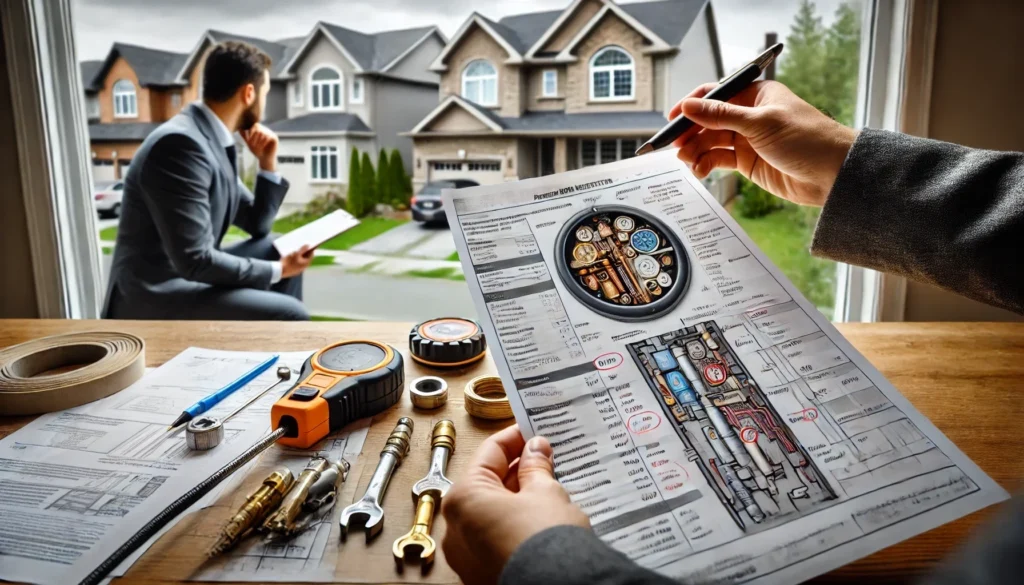One powerful tool that savvy buyers use to their advantage is the home inspection report. This detailed document not only provides insight into the condition of the property but also offers leverage to renegotiate the purchase price. In this blog, I’ll explore how to effectively use a home inspection report to renegotiate a lower price and secure the best deal on your new home.
Understanding the Importance of a Home Inspection Report
A home inspection report is a comprehensive evaluation of a property’s condition conducted by a professional home inspector. It covers various aspects of the home, including the structural integrity, electrical systems, plumbing, roofing, and more. This report is crucial for buyers because it highlights potential issues that may not be visible during a casual walkthrough.
Step 1: Attend the Home Inspection
One of the first steps in using a home inspection report to renegotiate a lower price is to be present during the inspection. Attending the inspection allows you to see issues firsthand, ask questions, and gain a better understanding of the property’s condition. Being there in person helps you grasp the severity of any problems identified. This knowledge will be invaluable when discussing the report with the seller.
Step 2: Review the Home Inspection Report Thoroughly
Once the inspection is complete, you’ll receive a detailed report. It’s essential to review this document carefully. Pay close attention to any significant issues that could impact the property’s value or require costly repairs. A thorough review ensures you don’t overlook any critical information that could be used in your negotiations.
Step 3: Prioritize Issues for Negotiation
Not all issues listed in the home inspection report will be worth renegotiating. Prioritize problems based on their severity and potential cost to repair. Focus on major issues that could affect the home’s safety, functionality, or long-term value.
Examples of Major Issues:
- Structural problems (foundation cracks, sagging roof)
- Electrical hazards (outdated wiring, overloaded circuits)
- Plumbing issues (leaks, outdated pipes)
- Roof damage (missing shingles, leaks)
- HVAC problems (furnace or air conditioning malfunctions)
By focusing on significant issues, you strengthen your negotiating position and avoid appearing unreasonable to the seller.
Step 4: Get Repair Estimates
Before approaching the seller with your findings, obtain repair estimates for the issues identified in the home inspection report. These estimates will provide a realistic idea of the costs involved and give you concrete numbers to present during negotiations. Having professional repair estimates adds credibility to your request for a price reduction or repairs.
Step 5: Prepare a Clear and Reasonable Request
When using a home inspection report to renegotiate a lower price, it’s essential to be clear and reasonable in your request. Outline the issues, provide the repair estimates, and explain how these problems impact the home’s value and your willingness to proceed with the purchase.
Example Request:
“Based on the home inspection report, we discovered several significant issues, including a leaky roof, outdated electrical wiring, and plumbing leaks. We obtained repair estimates totalling $15,000. Given these findings, we would like to request a reduction in the purchase price by $15,000 to account for these necessary repairs.”
A clear and reasonable request demonstrates that you are a serious buyer who is making informed decisions based on professional assessments.
Step 6: Be Prepared to Compromise
While your goal is to renegotiate a lower price using the home inspection report, it’s essential to be prepared for some level of compromise. The seller may offer to make the repairs themselves, provide a credit at closing, or meet you halfway on the price reduction. Flexibility can facilitate a more amicable negotiation process and increase the likelihood of reaching an agreement that satisfies both parties.
Step 7: Leverage Your Agent’s Expertise
Your real estate agent is a valuable ally in this process. They have experience in negotiations and can offer strategic advice on how to use the home inspection report to renegotiate a lower price effectively. Lean on their expertise to craft your request and navigate the negotiation process. An experienced agent can provide insights and guidance that enhance your negotiating position and help you achieve a favourable outcome.
Step 8: Use the Inspection Report as a Negotiation Tool
During negotiations, refer to the home inspection report frequently. This document serves as an objective third-party assessment of the property’s condition, strengthening your case for a price reduction or repairs. The home inspection report provides tangible evidence to support your claims, making it harder for the seller to dismiss your concerns.
Step 9: Be Patient and Persistent
Negotiations can be a lengthy process. Be patient and persistent in pursuing a fair resolution based on the findings in the home inspection report. Remember that your goal is to protect your investment and ensure the property’s condition aligns with its price.
Patience and persistence can lead to a more favourable outcome, even if negotiations take longer than expected.
Step 10: Know When to Walk Away
Sometimes, despite your best efforts, the seller may be unwilling to renegotiate based on the home inspection report. In such cases, it’s crucial to know when to walk away. Purchasing a home with significant unresolved issues can lead to financial strain and regret. Walking away from a bad deal protects your financial interests and allows you to find a property that better suits your needs and budget.
Conclusion
Using a home inspection report to renegotiate a lower price is a strategic approach that can save you thousands of dollars and ensure you’re making a sound investment. By attending the inspection, reviewing the report thoroughly, prioritizing issues, obtaining repair estimates, and making a clear request, you can leverage the findings to your advantage. Remember to be flexible, patient, and ready to walk away if necessary. With these steps, you’ll be well-prepared to navigate the negotiation process and secure the best possible deal on your new home in Ontario.



